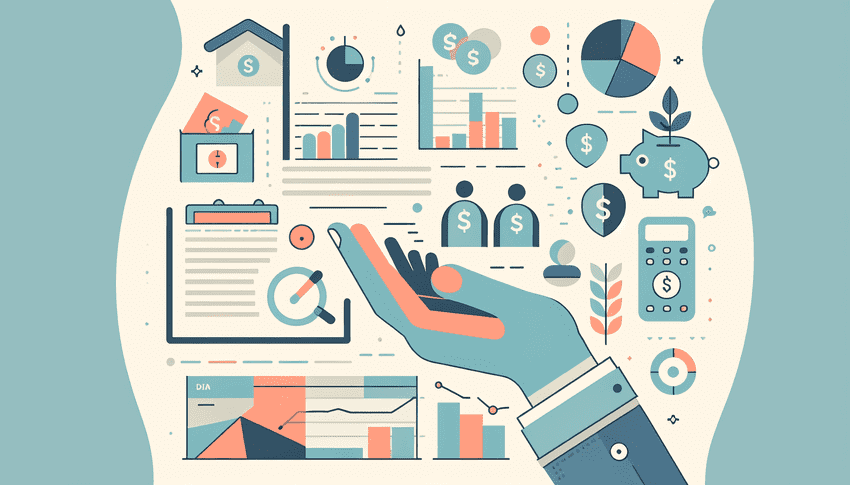Table of Contents
The Financial Fabric of Well-being

Economic Stability and Its Emotional Impact
In our exploration of Happiness Economics, we delve into the profound impact that economic stability has on our emotional well-being. When individuals enjoy a stable financial environment, they often experience a cascade of positive psychological effects. This stability can lead to reduced anxiety over financial matters, a greater sense of security, and more freedom to pursue personal growth and development.
Economic stability isn’t merely about having enough money to cover the bills. It’s a foundation upon which individuals can build a life that feels meaningful and satisfying. Studies have repeatedly connected financial security with a positive mental state. For example, research shows that people who don’t have to worry about unexpected bills or debts are more likely to report higher levels of happiness and overall life satisfaction.
- Financial security provides a buffer against the stresses of life, giving individuals a greater sense of control over their future.
- It allows people to make choices that align with their values and long-term goals rather than being driven by immediate financial concerns.
- Economic stability opens doors to educational opportunities, health care, and the ability to engage in leisure activities—all of which contribute to psychological well-being.
Economic Stability and Emotional Intelligence
The role of Emotional Intelligence (EI) within Happiness Economics is significant, particularly as it pertains to handling economic stability. Individuals with high EI are better equipped to manage their emotional responses to financial changes, whether positive or negative. They tend to maintain a balanced perspective during economic ups and downs, which further promotes mental health stability.
This emotional regulation extends to interpersonal relationships as well. People with economic stability and high EI are often able to invest more emotionally in their relationships, nurturing stronger and more supportive social networks. These networks, in turn, can offer additional resources and support during economically turbulent times.
Finally, economic stability, paired with Emotional Intelligence, can create a virtuous cycle where individuals are more equipped to make prudent financial decisions. This leads to further economic stability and promotes a sense of security that contributes to overall happiness.
To summarize, the intersection of economic stability and Emotional Intelligence lays the groundwork for a fulfilling life. Emphasizing the role of Happiness Economics in our quest for well-being, we see how financial stability can be a critical component in achieving a balanced and happy life.
The Role of Economic Growth in Individual Happiness
Exploring the intricate relationship between economic growth and individual happiness, it’s crucial to delve into how broader economic conditions affect our sense of well-being. The concept of Happiness Economics is becoming increasingly popular as researchers link personal finance and happiness. It’s clear that Financial Well-being and Economic Factors Joy are closely knit with our daily lives and have significant psychological impacts.
- Economic Growth and Personal Happiness
- The Influence of Job Opportunities on Well-being
- Economic Policies and Societal Happiness
Economic Growth and Personal Happiness
A country’s GDP growth often serves as a barometer for its economic health. While it may seem that such macroeconomic factors have minimal effects on personal emotions, there is substantial evidence that individual happiness is, to some extent, responsive to these larger economic forces. Studies in Happiness Economics have shown that there is a positive correlation between national wealth and average levels of reported happiness. Certainly, this does not imply that wealth directly translates to Emotional Health but rather that a flourishing economy can provide a fertile environment for enhancing elements of life that contribute to happiness, such as healthcare, education, and leisure activities.
Moreover, key findings in Financial Well-being research suggest that individuals are not just happier because they have more money, but the stability and lack of financial stress play a substantial role in improving one’s quality of life.
The Influence of Job Opportunities on Well-being
The availability and security of employment opportunities are tangible ways in which economic growth translates to personal contentment. Higher GDP growth often leads to a more vibrant job market. When individuals have access to gainful employment, it creates a sense of security and purpose which are fundamental components of Happiness. Work provides not only a source of income but also a sense of identity and a network of social relationships, all of which are pivotal to our happiness.
However, it is essential to consider that the mere existence of job opportunities is not enough; the quality of those jobs and how they align with individuals’ values and aspirations are equally important factors in how Economic Factors Joy is experienced.
Economic Policies and Societal Happiness
Economic policies designed to protect and improve the lives of citizens can lead to improvements in societal happiness. The link between Personal Finance and Happiness is often manifested through policies that ensure economic equity, provide social safety nets, and promote work-life balance. For instance, when governments implement policies that reduce income inequality, they create an environment where more individuals can participate in the economy meaningfully, leading to a stronger sense of community and belonging.
The realm of economics plays a profound role in shaping our Emotional Health and well-being. An economy that ensures equitable growth and prioritizes the happiness of its citizens can build the foundation for a thriving, positive society. By crafting economic strategies that consider the happiness of the individual, nations not only bolster their economic progress but also foster the emotional prosperity of their people.
Personal Finance Mastery and Contentment

Mindful Spending and Its Connection to Joy
Mindful spending is not just about tracking every dollar spent; it’s about aligning your financial decisions with your deepest values and desires, which is an intricate part of Happiness Economics. Those who practice mindful spending often find that their Emotional Intelligence is enhanced, as they become more attuned to their emotional responses to spending and saving. This subtle art of managing personal finance has shown a robust connection to joy and contentment.
The Emotional Intelligence of Spending
When we speak of Emotional Intelligence in the context of spending, we’re addressing the capacity to navigate financial decisions with a clear understanding of how those decisions affect our emotional well-being. Happiness Economics suggests that Emotional Intelligence is critical because it helps individuals recognize the difference between impulse purchases and investments that contribute to long-term happiness.
- Making purchases that align with personal values reinforces a sense of identity and purpose.
- Resisting short-term temptations in favor of long-term benefits can enhance feelings of self-worth and accomplishment.
- Understanding the emotional impact of debt and financial stress leads to more cautious and deliberate spending.
People with higher levels of Emotional Intelligence are better equipped to resist the immediate gratification that comes from impulsive spending, which is seldom associated with lasting happiness. They can also find more joy in purchases that may have no immediate payoff but contribute to well-being in the long run.
Experiences Over Possessions
Happiness Economics also delves into the debate between the value of experiences over material possessions. Research indicates that spending money on experiences, such as travel, dining out, or attending events, actually provides a longer-lasting boost to happiness compared to material purchases.
- Experiences can become a cherished part of our identity, increasing personal narratives that are sources of joy and pride.
- They enhance social connectedness, a significant component of happiness.
- Anticipation of an experience can bring joy even before the event occurs.
Material goods, on the other hand, often lead to hedonic adaptation – the phenomenon where the happiness derived from a new purchase fades quickly. Taking the principles of Happiness Economics into practice encourages us to invest in experiences that continue to provide happiness long after the event has passed.
Aligning Spending With Personal Values
One of the central themes in Happiness Economics is that money can indeed buy happiness if spent in line with one’s values and beliefs. Mindful spending requires us to ask ourselves whether a purchase is merely satisfying a fleeting desire or whether it is contributing to our long-term happiness and well-being.
- Donations to causes we care about can foster a sense of impact and connection, thereby enhancing our happiness.
- Investing in education and self-development aligns with growth and future opportunities.
- Spending on health and wellness promotes physical well-being, which is intrinsically linked to psychological happiness.
By taking the time to reflect on our personal values and ensuring that our spending habits reflect those values, we can strengthen the relationship between how we use our money and the joy we derive from it.
In conclusion, mindful spending has a multi-faceted role in advancing one’s happiness. Through elevated Emotional Intelligence, prioritizing experiences over possessions, and aligning expenditures with our values, we tap into the profound wisdom of Happiness Economics. The science is clear: when we spend mindfully, not only do our bank accounts benefit, but our overall sense of fulfillment and contentment is significantly enhanced.
The Power of Financial Literacy in Building a Happy Life
Financial literacy is often seen as a practical skill set, reserved for balancing budgets and managing investments. However, the burgeoning field of Happiness Economics is shedding light on a more profound connection: the link between financial education and overall happiness.
Understanding Financial Literacy
Financial literacy is the ability to comprehend and effectively apply financial management skills. These include budgeting, investing, and understanding debt. In the context of Happiness Economics, it’s not simply about accumulating wealth, but about creating the freedom and stability to enjoy life.
- Higher financial literacy correlates with lower stress levels. When individuals understand how to manage their finances, they tend to worry less about the future.
- People with a firm grasp on personal finance concepts are more likely to plan for retirement, contributing to a longer-term sense of security and contentment.
- Knowing how to conserve funds and allocate them effectively allows for allocating resources to experiences and items that bring joy and fulfillment.
Financial Education as a Path to Happiness
Individuals who dedicate time to financial education often see an improvement in their overall well-being. They are making informed decisions regarding saving, spending, and investing, which aligns their financial habits with their life goals. This behavioral shift can foster a deep sense of personal accomplishment and life satisfaction.
Happiness Economics suggests that the control and competence derived from financial literacy can elevate an individual’s Emotional Intelligence. It amplifies a person’s ability to regulate emotions, particularly in stressful financial scenarios. Thus, someone well-versed in personal finance is not only equipped to navigate the highs and lows of the economy but also the emotional rollercoaster that often accompanies money matters.
Taking Practical Steps
To journey towards greater financial understanding and happiness, consider the following strategies:
- Engage with financial education resources, like books, courses, or workshops, to enhance your understanding of money management.
- Create a financial plan that reflects your values and goals, ensuring that each financial decision supports your pursuit of a happy life.
- Incorporate mindfulness into your financial habits by regularly reviewing and adjusting your budget to adapt to life’s changing circumstances.
In conclusion, financial literacy is a cornerstone not only for achieving financial success but also fostering personal joy and satisfaction as indicated by Happiness Economics. The mastery over one’s finances goes beyond the figures in a bank account—it’s about crafting a life filled with choices that lead to authentic happiness. By focusing on improving financial literacy, we open ourselves to opportunities of not just wealth, but also wellbeing and profound emotional satisfaction.
Summary
In the fascinating realm of Happiness Economics, we explore the intricate relationship between economic stability and our subjective well-being. At the core, financial security serves as a foundation for a fulfilling life, extending beyond mere sustenance to enabling engagement in endeavors that enrich our existence.
Economic Stability: A Path to Personal Growth
The peace of mind that comes from not fretting over financial turmoil is indeed liberating. It affords us the luxury of looking forward, planning our lives around our passions and dreams. A stable financial backdrop often translates into reduced stress and an enhanced sense of autonomy. It’s a launchpad from which we soar into personal development, be it through education, healthcare, or leisure.
- Economic stability offers a shield against life’s adversities, allowing for more focused, value-driven choices.
- Such stability fosters access to resources that bolster personal enrichment and a robust mental state.
Emotional Intelligence: A Financial Fortitude
As we intertwine Emotional Intelligence (E) with economic wellness, high E becomes the steward of our fiscal voyage. Those gifted with E navigate the financial waves with dexterity, ensuring their psychosocial keel remains even. The composure afforded by E encourages more thoughtful and prosperous financial decisions, which in turn feeds back into the loop of stability and contentment.
Resilience leaps forward as a pillar of inner wealth in Happiness Economics. An emotional bulwark, resilience provides us the fortitude to withstand economic shocks and emerge with our sense of joy intact. Building resilience through gratitude, social ties, and adaptability empowers us to find contentment within, even when external fortunes may wane.
- Practicing gratitude and optimism lays the foundation for a resilient mindset.
- Nurturing social bonds offers emotional sustenance, pivotal for weathering financial uncertainty.
- Adapting to changing economic landscapes with fluidity keeps one’s life narrative progressive and positive.
The Joys of Experience and Intentionality
Happiness Economics also delves deeper, advocating for the joys found in experiences and social connections over material acquisitions. Engaging in community service, relishing experiences, and embracing continual learning offer profound satisfaction that financial wealth alone cannot.
Individuals high in E are more apt to discern the difference between fleeting and lasting sources of happiness. They exhibit a propensity for spending that resonates with their personal values, from philanthropy to self-improvement to wellness, reinforcing their identity and contentment.
- Experiences, often social in nature, forge stronger connections and create enduring happiness compared to physical goods.
- Aligning spending with personal values enhances emotional satisfaction, underpinning the central theme of Happiness Economics.
The Rich Tapestry of Financial Literacy
A cornerstone often overlooked in the pursuit of happiness is financial literacy. Not merely a skill for balancing a checkbook, comprehending and applying monetary principles influences our well-being. It instills a sense of command over our lives, reducing stress and paving the way for mindful, happiness-aligned spending.
Engagement in financial learning and mindful budgeting reflects a commitment to align one’s financial trajectory with a pursuit of a joyous existence. The emotional fortitude that springs from a solid financial understanding is a testament to the power of Happiness Economics.
- Financial literacy predicts lower anxiety about the future and aligns with long-term contentment and security.
- Investing time in financial education often results in better life choices, infusing a sense of achievement and overall happiness.
- Adopting a well-thought-out financial plan keyed to personal values is crucial for lasting emotional fulfillment.
Happiness Economics forms a nexus where economic stability, Emotional Intelligence, resilience, and financial literacy converge to chart a course for a well-lived, happy life. By embracing these principles, individuals and communities can not only weather economic storms but also find joy and contentment in the midst of them.
FAQ – The Economics of Happiness
How does the relationship between income level and subjective well-being change once an individual’s basic needs are met, according to the diminishing marginal utility theory?
According to the theory of diminishing marginal utility in the context of income level and subjective well-being, once an individual’s basic needs are met, additional income generates progressively smaller increments of happiness. Essentially, as a person earns more money beyond what is necessary for essentials, the added satisfaction each dollar brings decreases, illustrating that after reaching a certain economic threshold, factors other than income play a more substantial role in enhancing our overall happiness. This concept reminds us that while financial security is crucial, it is the richness of our relationships, engagements, and purpose that often weave the deeper threads of joy into the tapestry of our lives.
How do varying levels of personal debt influence reported happiness among individuals across different income brackets?
Research indicates that high levels of personal debt are generally associated with decreased happiness, with this impact being more pronounced among lower-income individuals. Those in higher income brackets may not feel the emotional strain of debt as acutely, since their resources provide a buffer against financial instability. Yet, regardless of income, manageable levels of debt aligned with one’s goals can conversely lead to feelings of satisfaction, as long as they are part of a strategic financial plan that aligns with personal values and aspirations.
How do variations in income levels impact the correlation between personal finance and reported happiness, and are there diminishing returns to happiness with increasing wealth?
Research indicates that while a rise in income can enhance happiness by alleviating stress and insecurity associated with financial strain, the correlation between wealth and reported happiness is subject to the principle of diminishing returns. Once basic needs are met, incremental increases in wealth have a reduced impact on an individual’s overall sense of well-being. This phenomenon is often explained by the ‘hedonic treadmill’ theory, which suggests that as people attain higher levels of income, their expectations and desires rise in tandem, which may offset potential gains in happiness.




